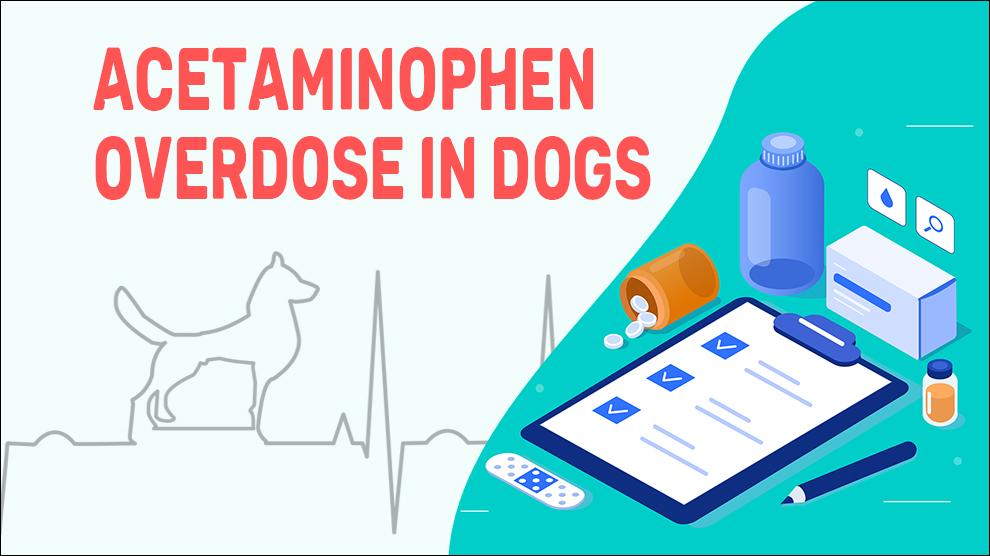What is Acetaminophen Toxicity In Dogs?
Tylenol (acetaminophen) is a popular over-the-counter (OTC) pain medication and anti-fever medication used by humans. Unfortunately due its popularity in the medicine cabinets, it can be accidentally ingested by our pets and has a narrow margin of safety in dogs and cats.
The acetaminophen poisoning severity depends on the species. Dogs can develop different clinical signs and problems with poisoning.
Symptoms Of Acetaminophen Toxicity In Dogs
In most dogs, 15 mg/kg orally q 8 h acetaminophen can be a safe dosage.
Toxic dose in most of the dogs is > 100 mg/kg. Clinical signs of acetaminophen poisoning in dogs include:
- Drooling
- Rapid breathing (known as “tachypnea”)
- Cyanosis due to methemoglobinemia
- Keratoconjunctivitis or Dry eye (abnormal greenish discharge and chronic squinting)
- Lethargy
- Lack of appetite
- Fluid buildup (edema)
- Vomiting
- Chocolate-colored urine and methemoglobinuria
- Increased liver enzymes
- Seizures
- Coma
Treatment Options For Acetaminophen Overdose In Dogs
Early treatment and decontamination reduces the risk of serious toxicity. If acetaminophen ingestion occurred within a few hours of treatment, the veterinarian may induce vomiting or perform cleaning out the contents of the stomach (gastric lavage).
Treatment may include:
- After clearing out the contents, providing a special preparation of liquid activated charcoal will slowdown the absorption of drug/poison from the stomach.
- Activated charcoal should only be administered by a licensed toxicologist/veterinarian. Otherwise, aspiration into the lungs and life-threatening changes in sodium levels may occur.
- N-acetylcysteine (Mucomyst) is used as the specific antidote for acetaminophen toxicity. This controls the formation of the poisonous substances that damages the red blood cells and liver.
- More intensive therapy is needed for pets with liver damage or high methemoglobin levels in the blood.
- Blood transfusions and intravenous fluid therapy for pets that develop anemia or methemoglobinemia
- They may also need dextrose in their fluids, liver protectants and Vitamin C.
Home Remedies For Acetaminophen Toxicity In Dogs
Whenever a toxic exposure is suspected, immediate action is recommended. Early consultation and treatment can help prevent serious health effects.
The followup care for dogs and puppies with Acetaminophen overdose is providing nutritional support through diet, Continual clinical monitoring of methemoglobinemia and Blood glutathione level.
Prevention Of Acetaminophen Overdose In Dogs
- Treatment in clinically affected pets may be prolonged and expensive so prevention is better than cure.
- Acetaminophen should only be given to dogs under a vet's supervision.
- The weight of the dog and Dosage should be always taken into consideration.
- Household medications should be kept out of their dog's reach to avoid a potentially harmful reaction
Affected Dog Breeds Of Acetaminophen Overdose
Beagle, Chihuahua, Bulldog, Labrador Retriever, Dachshund, Golden Retriever etc.
Puppies and small dogs.
Mischievous Breeds who are also hella chewers are at higher risk.
Additional Facts For Acetaminophen Toxicity In Dogs
Acetaminophen toxicity is common and occurs when over 75 mg per kg body weight of ingestion happens.
Signs of toxicity from acetaminophen may develop within 1–4 hours of ingestion.
Tylenol can also cause a fatal collapse of pet’s gastrointestinal, cardiovascular, respiratory or nervous system, kidney systems. When left untreated, Tylenol ingestion is typically fatal.
When To See A Vet For Acetaminophen Overdose In Dogs?
Right away transport your pet to closest vet clinic, if you suspect acetaminophen poisoning or when your dog is showing any signs of distress.
Don’t forget to take the remaining pills or pill bottle with you.
It is important to provide as much information as possible regarding the timing of ingestion, amount ingested, symptoms and the pet’s medical history, including what other medication they are taking.
Food Suggestions For Acetaminophen Toxicity In Dogs
Food that can be offered 24 hours after initiation of treatment:
- White Rice
- Broccoli, kale and brussell sprouts
- Boiled Chicken Breast
- Sardines, salmon and cod
- Potatoes or Sweet Potatoes
Conclusion
Acetaminophen (Paracetamol, Tylenol, N-acetyl-p-aminophenol, APAP) is a popular over-the-counter oral medication used for pain relief and fever reduction in people. Poisoning may happen when pets break into medicine cabinets.
In some cases, owners inadvertently administer acetaminophen to treat their pet’s pain at unsafe doses. Once swallowed, acetaminophen reaches the blood stream within 30 minutes; toxic effects are rapid and damage the liver and red blood cells.
Acetaminophen toxicity can be fatal. However, pets can survive if the condition is recognized, diagnosed, and treated quickly.

















